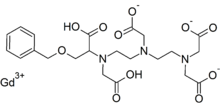Gadobenic acid
 | |
| Clinical data | |
|---|---|
| AHFS/Drugs.com | International Drug Names |
| ATC code | V08CA08 (WHO) |
| Identifiers | |
| |
| CAS Number |
113662-23-0 |
| PubChem (CID) | 105124 |
| DrugBank |
DB00743 |
| ChemSpider |
94843 |
| UNII |
15G12L5X8K |
| KEGG |
D08018 |
| ChEMBL |
CHEMBL1200571 |
| Chemical and physical data | |
| Formula | C22H28GdN3O11 |
| Molar mass | 667.72 g/mol |
| 3D model (Jmol) | Interactive image |
| |
| |
| | |
Gadobenic acid (INN, trade name MultiHance) is a complex of gadolinium with the ligand BOPTA. In the form of the methylglucamine salt meglumine gadobenate (INNm) or gadobenate dimeglumine (USAN), it is used as a gadolinium-based MRI contrast medium.[1]
BOPTA is a derivative of DTPA in which one terminal carboxyl group, –C(O)OH is replaced by -C–O–CH2C6H5. Thus gadobenic acid is closely related to gadopentetic acid. BOPTA itself was first synthesized in 1995. [2] In the "gadobenate" ion gadolinium ion is 9-coordinate with BOPTA acting as an 8-coordinating ligand. The ninth position is occupied by a water molecule, which exchanges rapidly with water molecules in the immediate vicinity of the strongly paramagnetic complex, providing a mechanism for MRI contrast enhancement. 139La NMR studies on the diamagnetic La-BOPTA2− complex suggest that the Gd complex maintains in solution the same kind of coordination as found, by X-ray crystallography, in the solid state for Gd-BOPTA disodium salt.[2]
See also
References
- ↑ Sweetman, Sean C., ed. (2009). "Contrast Media". Martindale: The Complete Drug Reference (36th ed.). London: Pharmaceutical Press. p. 1478. ISBN 978-0-85369-840-1.
- 1 2 Uggeri, F.; Aime, S., Anelli, P.L., Botta, M., Brocchetta, M., De Haën, C., Ermondi, G., Grandi, M., Paoli, P. (1995). "Novel contrast agents for magnetic resonance imaging. Synthesis and characterization of the ligand BOPTA and its Ln(III) complexes (Ln = Gd, La, Lu). X-ray structure of disodium (TPS-9-145337286-C-S)-[4-carboxy-5,8,11-tris(carboxymethyl)-1-phenyl-2-oxa-5,8, 11-triazatridecan-13-oato(5-)]gadolinate(2-) in a mixture with its enantiomer". Inorg. Chem. 34 (3): 633–642. doi:10.1021/ic00107a017.